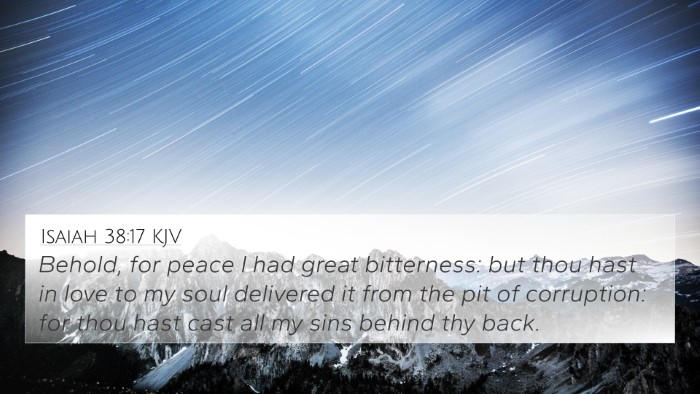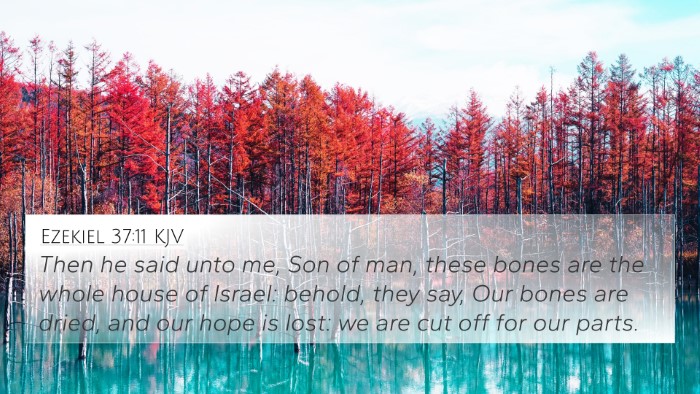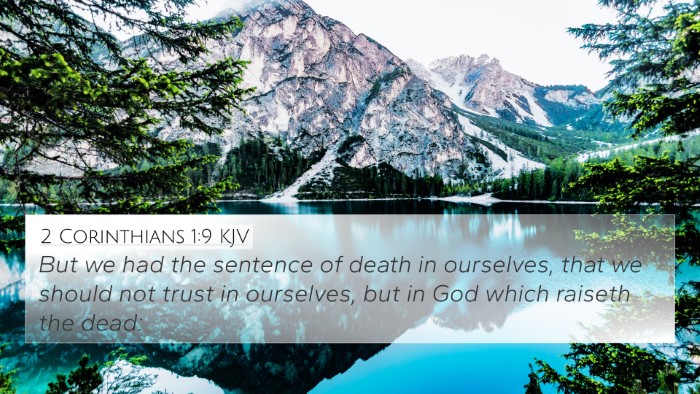Old Testament
Genesis Exodus Leviticus Numbers Deuteronomy Joshua Judges Ruth 1 Samuel 2 Samuel 1 Kings 2 Kings 1 Chronicles 2 Chronicles Ezra Nehemiah Esther Job Psalms Proverbs Ecclesiastes Song of Solomon Isaiah Jeremiah Lamentations Ezekiel Daniel Hosea Joel Amos Obadiah Jonah Micah Nahum Habakkuk Zephaniah Haggai Zechariah MalachiJob 17:16 Similar Verses
Job 17:16 Cross References
They shall go down to the bars of the pit, when our rest together is in the dust.
Uncover the Rich Themes and Topics of This Bible Verse
Listed below are the Bible themes associated with Job 17:16. We invite you to explore each theme to gain deeper insights into the Scriptures.
Job 17:16 Cross Reference Verses
This section features a detailed cross-reference designed to enrich your understanding of the Scriptures. Below, you will find carefully selected verses that echo the themes and teachings related to Job 17:16 KJV. Click on any image to explore detailed analyses of related Bible verses and uncover deeper theological insights.

Jonah 2:6 (KJV) »
I went down to the bottoms of the mountains; the earth with her bars was about me for ever: yet hast thou brought up my life from corruption, O LORD my God.

Job 18:13 (KJV) »
It shall devour the strength of his skin: even the firstborn of death shall devour his strength.

Psalms 88:4 (KJV) »
I am counted with them that go down into the pit: I am as a man that hath no strength:

Psalms 143:7 (KJV) »
Hear me speedily, O LORD: my spirit faileth: hide not thy face from me, lest I be like unto them that go down into the pit.

Isaiah 38:17 (KJV) »
Behold, for peace I had great bitterness: but thou hast in love to my soul delivered it from the pit of corruption: for thou hast cast all my sins behind thy back.

Ezekiel 37:11 (KJV) »
Then he said unto me, Son of man, these bones are the whole house of Israel: behold, they say, Our bones are dried, and our hope is lost: we are cut off for our parts.

2 Corinthians 1:9 (KJV) »
But we had the sentence of death in ourselves, that we should not trust in ourselves, but in God which raiseth the dead:
Job 17:16 Verse Analysis and Similar Verses
Understanding Job 17:16
The verse Job 17:16 states: "And where is now my hope? as for my hope, who shall see it?" This profound question encapsulates Job's feelings of despair and isolation as he grapples with the sense of lost hope amidst his afflictions.
Summary of Insights from Public Domain Commentaries
In order to delve deeper into the meaning of Job 17:16, we can explore insights from several commentaries:
-
Matthew Henry:
Henry highlights Job's deep sense of hopelessness. He notes that Job's physical suffering has led to a spiritual and emotional burden, making him question the very foundation of his hope. Henry emphasizes that Job's rhetorical questioning points to the absence of any assurance or promise of recovery from his miseries.
-
Albert Barnes:
Barnes expands on the metaphorical aspects of Job’s condition, indicating that the hope Job refers to is intertwined with his faith and expectation of vindication. He suggests that Job feels as if there is no one to support him in his grief, thus leaving him to muse if any relief will ever come into view.
-
Adam Clarke:
Clarke identifies the existential crisis within Job’s words. He sees the hope not merely as physical well-being but as a broader spiritual expectation of life itself. Clarke narrates that Job echoes a common human experience—the fear of losing hope in the midst of profound suffering, which resonates through the ages.
Thematic Connections and Cross-References
Job 17:16 finds relevance through various biblical themes and connections. Below are cross-referenced verses that reflect similar themes of hope, despair, and existential inquiry:
-
Psalms 39:7: "And now, Lord, what wait I for? my hope is in thee."
This verse shows a parallel existential query regarding hope as linked to divine trust.
-
Psalms 42:5: "Why art thou cast down, O my soul? and why art thou disquieted in me? hope thou in God."
This entreaty to hope in God complements Job's lament by providing a resolution through faith.
-
Lamentations 3:21-23: "This I recall to my mind, therefore have I hope. It is of the Lord's mercies that we are not consumed."
Lamentations echoes themes of suffering but reframes them with a remembrance of hope.
-
Matthew 11:28: "Come unto me, all ye that labour and are heavy laden, and I will give you rest."
In this invitation, the burden of despair is contrasted with the promise of hope through Christ.
-
Romans 5:5: "And hope maketh not ashamed; because the love of God is shed abroad in our hearts."
This New Testament perspective layers the Old Testament struggle with the assurance of God's love.
-
Isaiah 40:31: "But they that wait upon the Lord shall renew their strength; they shall mount up with wings as eagles."
This verse portrays a redemptive aspect of waiting and hoping in God, contrasting Job's moment of despair.
-
Hebrews 11:1: "Now faith is the substance of things hoped for, the evidence of things not seen."
An exploration of faith complements Job's questioning by highlighting the unseen hope in God's promise.
The Importance of Cross-Referencing
Cross-referencing Biblical texts such as Job 17:16 is vital for a comprehensive understanding of scripture. Here are some tools and methods for effective Bible cross-referencing:
- Bible Concordance: A tool that allows readers to find where specific words and themes occur throughout scripture, facilitating thematic connections.
- Cross-Reference Bible Study: Engaging in a study that links verses across the Bible aids in revealing the interconnectedness of themes such as hope and despair.
- Bible Cross-Reference Guide: Resources that compile cross-references can enrich personal study and sermon preparation by illuminating connections not immediately visible.
- Bible Chain References: These references provide a pathway through various verses that speak to similar themes, offering a holistic view of scripture.
Conclusion
Job 17:16 embodies a poignant inquiry into hope, reflecting not only Job's anguish but also prompting readers to explore the rich tapestry of scriptural hope found throughout the Bible. In studying this verse, one engages with an inter-Biblical dialogue that emphasizes the experience of suffering while simultaneously pointing toward the potential for hope through divine support.




